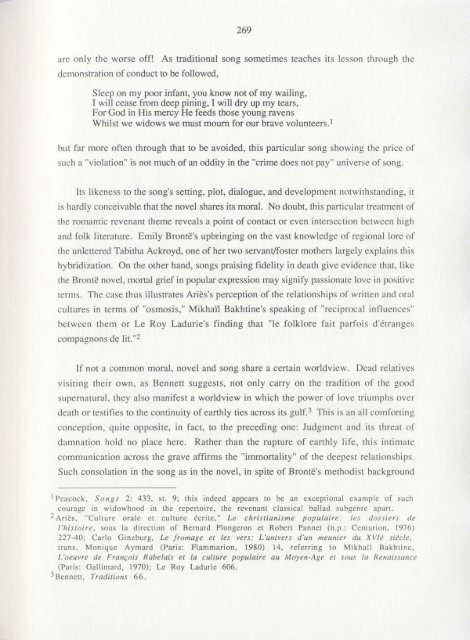Untitled - Memorial University's Digital Archives - Memorial ...
Untitled - Memorial University's Digital Archives - Memorial ...
Untitled - Memorial University's Digital Archives - Memorial ...
Create successful ePaper yourself
Turn your PDF publications into a flip-book with our unique Google optimized e-Paper software.
269<br />
arc only the worse off! As traditional song sometimes teaches its lesson through the<br />
demonstration of conduct to be followed,<br />
Sleep on my poor infant, you know not of my wailing,<br />
I will cease from deep pining, I will dry up my tears,<br />
For God in His mercy He feeds those young mvens<br />
Whilst we widows we must mourn for OUf brave Yolunlcers.\<br />
but far more often through that to be avoided, this particular song showing the price of<br />
slIch a "violation" is nal much of an oddity in the "crime does not pay" universe of song.<br />
Its likeness to the song's sC[ling, plOI, dialogue, and development notwithstanding, it<br />
is hardly conceivable that the novel shares its moral. No doubt, this particular treatment of<br />
the romantic revenant theme reveals a point of contact or even intersection between high<br />
and folk literature. Emily Bronte's upbringing on the vast knowledge of regional lore of<br />
the unlettered Tabitha Ackroyd, one of her two servant/foster mothers largely explains this<br />
hybridization. On the other hand, songs praising fidelity in death give evidencc that, like<br />
thc Bronte novel, mortal grief in popular expression may signify passionate lovc in positive<br />
terms. The case thus illustrates Aries's perception of the relationships of wrincn and oral<br />
cultures in terms of "osmosis," MikharI Bakhtine's speaking of "reciprocal inOucnces"<br />
between them or Le Roy Ladurie's finding that "Ie folklore fait parfois d'etranges<br />
compagnons de JiI."2<br />
If 110t a common moral, novel and song share a certain world view. Dead relatives<br />
visiting their own, as Bennett suggests, not only carryon the tradition of Ihe good<br />
supernatural, they also manifest a worldview in which the power of lovc triumphs ovcr<br />
death or testifies 10 the continuity of earthly ties across its gulP This is an all comforting<br />
conception, quite opposite, in fact, to the preceding one: Judgment and its threat of<br />
damnation hold no place here. Rather than the rupture of earthly life, this intimate<br />
communication across the grave affirms the "immortality" of the deepesl relationships.<br />
Such consolation in the song as in the novel, in spite of Bronte's methodist background<br />
t Pcacock, Songs 2: 433, st. 9; this indeed appears to be an exceptional example of such<br />
courage in widowhood in the repertoire, the revenant classical ballad subgenre apart.<br />
2 Ar ics, "Culture orale et culture ccrite," Le christianisme populaire: II'S dossiers de<br />
/'histoire, sous la direction of Bernard Plongeron ct Robert Pannet (n.p.: Centurion, 1976)<br />
227-40; Carlo Ginzburg, Le jromage et les vcrs: L'univers d'un meunicr du XVle siecle,<br />
trans. Monique Aymard (Paris: Flammarion, 1980) 14, referring 10 Mikharl Bllkhtine,<br />
L'oeuvre de Franr;ois Rabelais el fa cuflUre populaire au Moyen-Age el sous Itl Nenai.fS(Jnce<br />
(Pllris: Gllllimard, 1970); Le Roy Ladurie 606,<br />
3Bennett, Traditions 66.

















